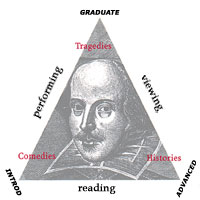from
Purgation Through Time
by
Kris Rankin

. . .Playing the part of Hermione at the trial is a bit difficult because of her angelic goodness. While one can imagine both her sorrow and her dignity the problem is to identify these feelings with some way of expressing them. Too much pleading sorrow is not upholding her stoic dignity and too much anger overshadows her superhuman piety. The BBC comment, referring to the whole production, in some ways sums up the dilemma of Hermione at trial; she has "too little to do...[with] too many lines...intoned reverentially." Anna Calder-Marshall, however, did a better job than I in expressing Hermione's turmoil; she did it through anxiety. She is like a fallen angel; out of her element. Although Hermione, as a prisoner, is restrained and unable to move freely to express herself, Calder-Marshall conveys a sense of forced composure through her slow, quiet, deep breaths and the thoughtful meditative licking of her lips before she addresses the King. Acutely aware of time's advance, she is choosing her words very carefully, conscious that one may have the power to save her life and or redeem her honor. yet, her eyes move nervously from the court to the King all the while, showing her discomfort at the publicity of her situation.
In contrast, the 431 Players production portrayed a much more restrained Hermione at the trial, whose actions were completely paralyzed with anxiety. This Hermione is unaware of the time and place of the court and pleads only to her husband; and does so in such hushed tones as though they really were in their own bedroom and not at all at a public trial. Leontes, Ben Gardella, sensing her fear, takes advantage of her victim stance portraying Leontes as an attacker, approaching his victim and stalking her in circles. He threatens her with his voice as well as with his physical presence, touching her face as he threatens that she might "feel" his justice.
This sort of motion and gesture is quite vital to a good presentation of Shakespeare, since there are so many long speeches. Gardella is sensitive to the need to add motion to the words and in his appeal to Apollo he takes advantage of the whole stage space left to him upon the exit of Hermione and Paulina. He addresses Apollo with beseeching gestures and laments with frantic and sorrowful expressions his bad judgment and foolish behavior. In contrast, the long unbroken close ups on Hermione and Paulina took some of the life from their words. The words were left without definite significance in time or space and finally appear merely as recitational and "intoned reverentially" speeches. Particularly with Karen Coley's energetic Paulina, this camera angle detracts from the emotional gestures and - since I was there I know - from the emotional reactions on the King's face. As he listens, the tyrant retreats and Leontes is "at last, reduced now to silence, sculpted into the image of mortified man." [Frye 136.] Ben visually expressed that transition extremely well, not to mention the director's very telling positioning of Paulina visually dominating over the now slouching King.
The conception and significant portrayal of such subtle points obviously makes the contribution by the directors vital, they are artists themselves really, because in every interpretation, of Shakespeare or any book or play, there is an image created. As with writing, directing is an attempt to express a personal vision and or conception of a theme. Just as Shakespeare, through writing plays like The Winter's Tale, is able to present characters, images and situations in which there are human emotions and reactions which we recognize to some degree in ourselves, directors can make those words come alive through sound and image on film or stage.
. . .
| TOP |